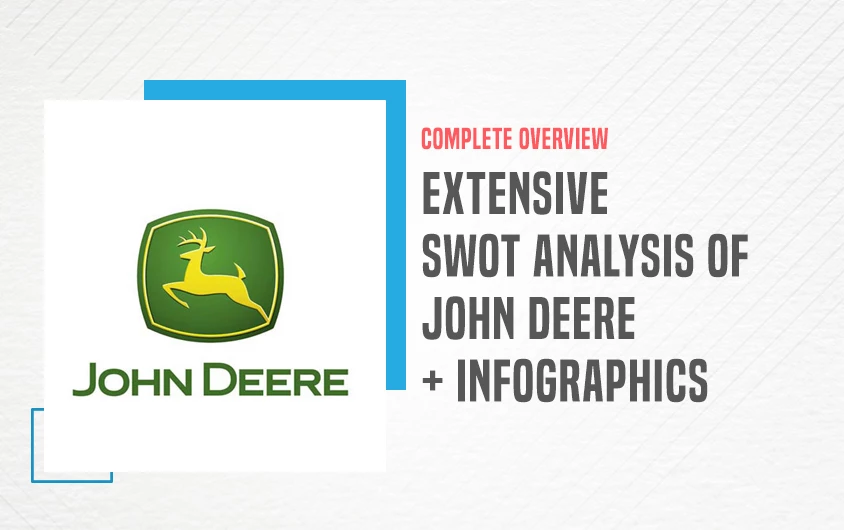In our previous blog, we did an Elite SWOT Analysis of the world’s largest defense contractor, Lockheed Martin. Here we will be doing an Extensive SWOT Analysis of John Deere. It is the producer of one of the biggest tractors in the world. It is also the producer of one of the world’s most powerful tractors.
John Deere has been able to gain such extensive success in its industry with the use of its marketing techniques. It can still improve its market standing with the use of digital marketing as most people are using digital platforms, hence it is important for every business to have a digital presence. If you are curious about learning what digital marketing is and how to use it to your advantage – check out our Free MasterClass on Digital Marketing 101 by the CEO and Founder of IIDE, Karan Shah.
Thus this makes us Anxious to know how John Deere is so successful in maintaining a prominent position in the market. To understand that we have given an Extensive SWOT Analysis of John Deere. But before we start with its SWOT Analysis let us learn about John Deere as a Company, its Products, competitors, financials, and more.
About John Deere
Deere & Company ( John Deere ) is a Global Enterprise. It was founded in the year 1837, by John Deere. It has its headquarters situated in Moline, Illinois, US. It’s a heavy equipment and engineering company. With over 180 years of experience in its pocket.
John Deere’s intelligence-connected machines and equipment are supplied to almost every industry, including, Agriculture, Construction, Landscaping & Ground care, Golf & Sports Turf, Forestry, Lawn and garden, Engines and drive trains, Rental Services, Government and military Sales, etc.
The 74 thousand-employee team of John Deere also provides financial services along with Manuals, Machinery Parts, Training, and Support Services. The company which is spread over 100 countries in the world, is currently headed by John C. May, who has been the Chairman and Chief Executive Officer since November of 2019.
Deere has reached great market heights all the while sticking to its core values of work ethic, quality, and the unprecedented treatment of customers, investors as well and employees. Productivity and Sustainability are the bases for the growth of the company. And from all of this information, we can see that John Deere truly helps life leap forward.
| Founder | John Deere |
|---|---|
| Year Founded | 1837 |
| Origin | Illinois, US |
| No. of Employees | 69,634 (2020) |
| Company Type | Public |
| Market Cap | $84.30 Billion (2020) |
| Annual Revenue | $35.54 Billion (2020) |
| Net profit | $811 Million (2020) |
Current News about the brand
- Deere & Company headquartered in Moline, Illinois announced earnings of $2.978 billion, in the quarter that ended on July 30, 2023. This translates to $10.20 per share as compared to the year’s third-quarter earnings of $1.884 billion ($6.16 per share) for the period ending on July 31, 2022.
- Over the nine months of this year, Deere & Company recorded an income of $7.797 billion ($26.35 per share) whereas during the same period last year, it was $4.885 billion ($15.88 per share).
- The company witnessed an increase in net sales and revenues during the third quarter of 2023 with a growth rate of 12% reaching $15.801 billion overall. Additionally, over the span of nine months, net sales surged by 24% amounting to $45.839 billion, in revenue for Deere & Company compared to year’s figures of $13 billion and $33.565 billion respectively.
Buyer Persona

Buyer’s Persona
Name:
Frank Johnson
Place:
USA
Age:
45 years
Profession:
Owner-operator of a 300-acre family farm
Motivation
- Latest equipment
- Pricing
- Maintenance assistance
- Quality Products.
Interest & Hobbies
- Farming
- Singing
- Baking
Pain Points
- Sustainability
- Technology
- Reputation for quality and long-lasting equipment.
Social Media Presence
- YouTube
SWOT Analysis of John Deere
Strategic planning is very important for the successful growth of any organization. SWOT Analysis is an important tool of strategic planning that helps John Deere managers do a situational analysis of the company.
SWOT Analysis helps to review a company’s strengths, weaknesses, opportunities, and threats concerning its competitors. It is an amazing method used to see where a company rises or falls, helps compose countermeasures and determines how the company may grow.
Let’s dive into its SWOT Analysis by first looking at the Strengths of John Deere.
Strengths of John Deere
John Deere gets its competitive advantage because of the various strengths that it possesses. Following are some of the Strengths of John Deere:
- Diverse Product and Service Portfolio – John Deere specializes in having a variety of products and services. They have a huge product and service portfolio in 3 particular domains i.e., equipment, parts, and finance. This also has many variants in trucks, cutters, shedders, dozers, backhoes, engines, loaders, mowers, tractors, etc. They also provide machine parts for agriculture, lawn, and garden, commercial mowing, construction, and maintenance. Their financial services include equipment loans, equipment leases, and account plans such as Multi-Use, Power Plan, and Revolving Plan accounts.
- Customer Relationship Management System – John Deere has a very strong CRM system. Being in the industry for so many years and maintaining a prominent position in the market for over 180 years is not an easy task. John Deere has been able to do this because it believes in maintaining the trust of its customers. The company provides reliable equipment that is ever-innovating. They adhere to every customer’s request with sincerity and cater to all their needs. This has helped incredibly in the company’s growth.
- Huge Employee Base – John Deere has a vast employee base. They have, in their team, almost seventy-four thousand employees that cater to every aspect of the business. They all have been trained to have excellent work ethics. Their highly equipped employee base has helped the company maintain customer satisfaction and in turn spread goodwill in the market.
- Strong Financial Position – Being this experienced in the industry, John Deere has also managed to hold a strong financial position. Being a leader in agricultural equipment, construction, and machinery, has led the company to gain high asset leverage. They have a large customer and investor network which has aided their financial success.
Weaknesses of John Deere
Weaknesses are the factors that create a problem in the functioning of John Deere. Following are some of the Weaknesses of John Deere:
- Limited Awareness – Though being in the industry for over 180 years, John Deere has limited global awareness and penetration compared to a few other industry leaders. The company does not have as enough fame as one would hope. They need to enhance their goodwill and position in the market.
- Technological Complications – John Deere sells innovative and technologically run equipment and machinery. This causes a problem because not every buyer is technologically advanced. Plus, the obligations of its IT communications and interface turn out to be more compound and greater by the day. This affects the client’s purchasing and the position of the company in the market.
Opportunities for John Deere
Opportunities are the factors that help John Deere grow in the market. Following are some of the Opportunities for John Deere:
- Flexibility – John Deere is a flexible company and quickly adapts to the changing times in terms of technological development. The company has the capability to quickly budge into the fresh rising market. They can provide advanced and efficient equipment to the targeted audience. They have a great opportunity to revolutionize agriculture with technology.
- Expansion – The current policy of John Deere to expand and support changes in Asia, Europe, and the East, has presented them to many new and fresh markets to compete in. With the growth of population and the growing need for agriculture and construction, the company can see potential in emerging markets.
- Acquisitions – John Deere can expect a lot of growth in the future if it collaborates and ties up with other global companies. These acquisitions can help drive inorganic growth. It will increase the company’s assets and divide the liabilities. They can provide new markets and great exposure globally.
Threats to John Deere
Threats are the negative factors of a company that can create a problem for John Deere in the future. Following are some of the potential threats to John Deere:
- Changing Laws – The changing economy, interest rate, and government regulations of all the different countries pose a huge threat to the company. John Deere is spread over a large number of countries whose laws and agricultural regulations keep changing. The company needs to be flexible enough to adapt to these fresh regulations and work with the countries in harmony.
- Labor and Workforce Issues – John Deere has a large workforce, and with a large workforce, comes maintenance and training. Having this large number of employees work in harmony is a difficult task and can cause issues.
- Financial Risks in Foreign Markets – Entering foreign markets can introduce a company to a lot of financial risks. Thus, John Deere needs to be focused and reduce its attention on further establishing marketplaces, or else, countries like the U.S. can rush the danger of down market share to very active competitors inside them.
Example of a Failed Campaign Or Backlash from Viewers
Deere’s Right to Repair Controversy: John Deere faced backlash and controversy related to the “Right to Repair” issue. This issue revolved around the restrictions the company placed on farmers and equipment owners regarding the repair and maintenance of their equipment. John Deere had implemented software locks and proprietary repair tools that made it difficult for farmers and independent repair shops to fix their own equipment or seek repairs from non-dealer sources.
Farmers and advocates argued that these restrictions made repairs more expensive and time-consuming, especially in rural areas where access to authorized John Deere dealerships was limited. This controversy led to negative publicity and a broader debate about consumers’ rights to repair the products they own.
The backlash included:
- Farmers and advocacy groups actively lobbying for legislation to enforce “Right to Repair” laws that would require manufacturers like John Deere to provide easier access to repair documentation, tools, and parts.
- A social media campaign highlighting the difficulties faced by farmers and equipment owners due to these restrictions.
- Negative media coverage and scrutiny from consumer rights organizations.
While this controversy did not result in a failed campaign by John Deere, it did generate significant negative attention and prompted discussions about consumer rights and the agricultural equipment industry’s practices. It serves as an example of how companies in the agricultural sector can face backlash when their policies are perceived as limiting customer freedom and choice.
Top 5 Competitors of this brand
- Caterpillar Inc.: It is a global leader in the manufacturing of construction and mining equipment, diesel and natural gas engines, industrial gas turbines, and diesel-electric locomotives. They compete with John Deere in various construction and heavy equipment segments.
- CNH Industrial N.V. (Case New Holland): It is a multinational manufacturer of agricultural and construction equipment, trucks, commercial vehicles, and powertrains. They operate under various brand names, including Case IH, New Holland Agriculture, and Case Construction. CNH is a significant competitor in the agricultural equipment sector.
- AGCO Corporation: It is another major player in the agricultural machinery and equipment industry. They manufacture and distribute agricultural equipment, including tractors, combines, and other farm machinery. AGCO competes directly with John Deere in the agricultural equipment market.
- Kubota Corporation: It specializes in the production of a wide range of agricultural machinery, construction equipment, and engines. They are known for compact tractors, construction excavators, and other equipment. Kubota competes with John Deere, especially in the compact and sub-compact tractor segment.
- Mahindra & Mahindra Limited: It is an Indian multinational manufacturer of agricultural machinery and utility vehicles. They have a significant presence in the compact tractor market, often competing with John Deere and Kubota in this segment.
Conclusion
On the study of the SWOT Analysis of John Deere, we have known that it is the producer of one of the most powerful tractors in the world. It has a diverse product and service portfolio in the market and a good customer relationship management service. It can grow its business by expanding into new markets and acquiring companies. Even with such advantages in the market, John Deere has some flaws in the market.
John Deere just needs to be careful while entering new markets and make their equipment a little less complicated. They also need to adapt to the changing laws and work with each country in harmony. They can use advanced digital marketing techniques to market their products in new countries at a lower cost because most people nowadays are online and it is easy to target only potential customers using digital marketing. Thus digital marketing is essential for every business nowadays. If you are interested in upskilling and learning, check out IIDE’s 3-Month Advanced Online Digital Marketing Course to know more.
If you like to read such detailed analyses of companies, find more such insightful case studies on our IIDE Knowledge portal. Thank you for taking the time to read this, and do share your thoughts on this case study in the comments section below.






![A Comprehensive Guide to an MBA in Digital Marketing in Sharjah, [year].](https://iide.co/wp-content/w3-webp/uploads/2023/08/DM-Courses-in-India-5-2-396x250.pngw3.webp)
0 Comments